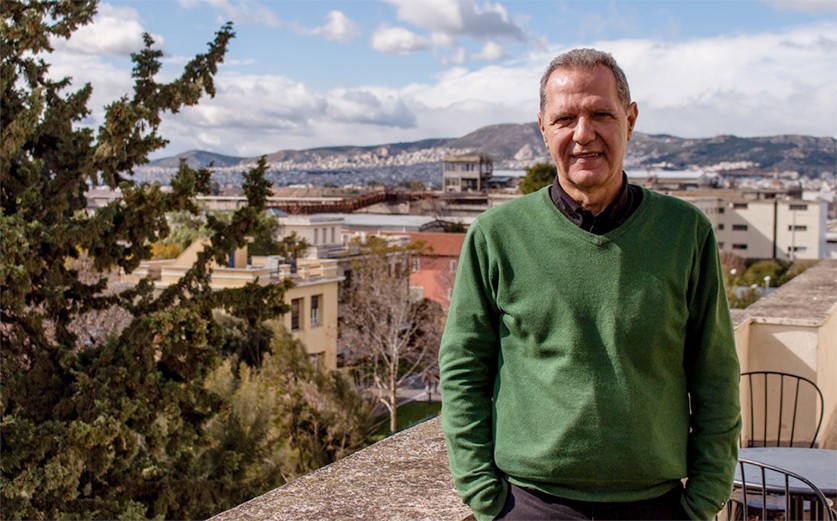Meet Serkos
Serkos Haroutounian is a Professor of Chemistry and Vice Rector of Academic, Administrative, and Student Affairs at the Agricultural University of Athens (AUA). He has recently become the scientific officer at AUA responsible for the “New Agriculture for a New Generation” program.
Serkos served as Chairman of the Board of Directors of the Hellenic Agricultural Organization DIMITRA (ELGO DIMITRA) from 2013-2015. ELGO DIMITRA is the largest agricultural organization in Greece, responsible for rural research, training, and education in the agricultural sector; control and quality assurance of Greek agricultural products; as well as all controls in the meat and dairy circuit.
With a scientific background in chemistry, Serkos’s main area of study is biomedical research with a specialization in the study of estrogen hormones and the development of new anti-cancer drugs. He earned his PhD at AUA in collaboration with the University of Illinois, where he later returned as a postdoctoral researcher (1985-1987) and then as a visiting professor (1992-1993). When I visited him at his office at AUA, he showed me a framed diagram of his academic pedigree, a lineage of mentorship that goes all the way back to 15th century Italian doctors and 17th century French apothecaries.
“I often tell my students: In 30 years, 62% of jobs will concern specialities we can not even imagine today. Without a solid scientific background, you will not be able to succeed. Basic sciences like chemistry will give you a solid foundation for the future.” Serkos told me about his father, who started working as an electrician in the early 1950s. Originally, he was repairing jukeboxes, then radios. Then came the transistors, then the TV--first black and white, then color--and now the modern flatscreen. “If he had only learned the jukebox, we would have died of hunger!” Serkos said. He seems to have inherited his father’s appetite for challenges and new knowledge. He recently changed departments, joining the Department of Animal Production and Aquaculture Sciences. In addition to biomedical applications of organic chemistry, his research interests now include natural products, climate change mitigation, and the promotion and certification of Greek traditional agricultural products.
“Greece does not produce large quantities of its products,” Serkos said. “Productions are small. A medium-production winery in Greece produces 150,000 bottles, while one in California produces 3-5 million bottles. You understand the difference in scale economies and the impact on the final price. We cannot compete with them on price. Instead, we have to invest in the quality and uniqueness of our products.”
The Wine, Fava, and Tomataki of Santorini
Serkos has done much work to study and promote the local products of Santorini. Although the island’s particular soil-climate environment (volcanic soil, constant sunshine, poor water resources, and strong winds) is not conducive to agriculture, it offers some important advantages, mainly because crops must grow under such stressful conditions. To cope with these unfavorable conditions, the plants produce secondary metabolites, substances with significant bioactivity, For example, Santorini grapes are particularly rich in polyphenols, which are known to exhibit significant antioxidant activity and are used to produce a wide array of cosmetics, medicines, and dietary supplements. Similarly, Santorini wines are much richer in polyphenols than the wine of other regions.
And because Santorini, due to its geomorphology, can not sustain extensive sheep and goat farming, its inhabitants have traditionally cultivated fava as a source of protein. Although fava is grown all over the world, the variety cultivated in Santorini (Lathyrus clymenum) is unique. It is an ancient variety, rich in protein, which was thought to have become extinct. However, the discovery of fava remains in the prehistoric settlement of Akrotiri, the ancient Minoan settlement that was destroyed by the explosion of the Santorini volcano in the 16th century BCE, enabled scientists to certify that the same variety was still being cultivated on the island. Santorini fava boils faster, has a soft, light texture, and has a special, slightly sweet taste. As a result, it’s much more expensive than other varieties of fava.
Finally, due to its particular soil, Santorini’s tomataki (little tomato) is much sweeter and healthier than those grown on mainland Greece.
Serkos has also been involved in the promotion and certification of a variety of other Greek agricultural products, including the tsipouro of Tyrnavos, the Vatikiotio onion, and the cheeses of central and northern Greece (Tsalafouti, Kaskaval, and Kalloni).
Exploiting the Knowledge of the Ancient Greeks
Serkos is also interested in the ancient Greeks’ knowledge of the pharmaceutical uses of plants. His research team has studied the work of Dioscorides, a Greek physician of the first century AD who studied medicinal plants and the medicines that can be obtained from them. Based on Dioscorides’ ancient texts, Serkos’ team published a journal article in 2015 that mapped modern plants to those mentioned by Dioscorides. Today, Serkos continues to study these formulations, but also their production using modern techniques. The knowledge gained from these studies helped Serkos implement the EU-funded research project LIFE-CONOPS to combat new species of mosquitoes that have invaded Greece and Italy as a result of climate change. Based on the ancient Greeks’ knowledge that juniper wood is not penetrated by insects, Serkos and his team studied all the juniper species in Greece to develop a new mosquito repellant that is expected to be released next summer.
“I started at AUA as a scientific collaborator in 1981, and this is my 38th year of teaching,” Serkos said. “Now when I tell my students how long I’ve served at AUA, they just stare at me.”
Serkos will attempt to make the NANG program at AUA more effective and open to new activities. To this end, he is collaborating with Professor George Papadakis from the Department of Natural Resources and Agricultural Engineering. “George specializes in energy efficiency, modern sustainable agriculture, and renewable energy sources, all of which will help promote innovation in the program,” Serkos said.

